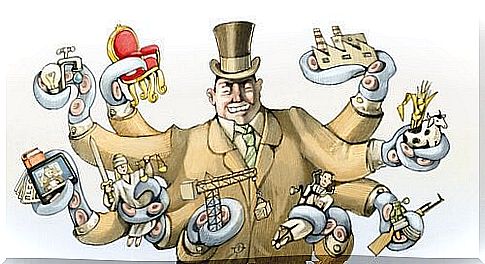From Selfishness To Self-love According To Aristotle

Aristotle once said “ someone asked if it is better to love oneself with preference over everything else or if it is more worthwhile to love the other ”. This wise Greek philosopher postulated a unique view of selfishness and its intimate relationship with self-love. Let’s get to know a little more about your singular deduction?
Before continuing, let me clarify that we are going to focus on his famous work “Ética a Nicomaco”. To be more exact, we will go directly to Chapter VIII of the ninth book, entitled “From selfishness to self-love”.
Love for oneself according to Aristotle
Throughout this chapter of Aristotle’s extensive work, the philosopher demystifies with a deductive line what he considers to be a virtuous man. In this work, the author focuses on comparing self-love and selfishness.

This philosopher considers that the real facts contradict the theories of selfishness. While it’s true that loving your best friend is a virtue, it also assumes that we ourselves are the best friends we can ever have. That is, you yourself are your best friend. Then comes the question: is it selfish to love yourself? Of course, the closest relationship you can have in life is with yourself. In the end, who do we live with 24 hours a day and who do we have to put up with whatever their mood?
The two types of selfishness that Aristotle stipulates
Once the philosopher establishes the precepts of self-love, he launches into the explanation of the two meanings he finds in selfishness. Although it considers that the term has a pejorative and shameful aspect, it also assumes that there is a much higher variable.
The first type of selfishness that Aristotle presents focuses on the love of the earth. The philosopher equates this way of acting with that of the people, that is, that of the majority, whom he calls vulgar. Undoubtedly, this is the result of an excessively class-oriented society like that of ancient Greece.
In this case, Aristotle identifies this first type of selfishness as the most vivid anxiety for bodily pleasures. That is, these people keep for themselves the greatest riches, honors and possessions. They have true devotion to hoarding that which is material, the more precious the better. That is, his only purpose is to satisfy his desires and passions, which he considers to be listening to the most irrational part of the soul. He sees it as a vulgar, deplorable, and very widespread custom. As such, it would be a reprehensible attitude.
But soon the classical philosopher reckons that those men who are guided by the highest quotas of justice and wisdom are also selfish. However, they are people who seek virtue, good works and beauty. He finds nothing objectionable about that attitude.
Selfishness gives way to self-love
We continue to speak of this second type of selfishness that Aristotle considers. How not to call a person selfish, given body and soul to the pursuit of wisdom, justice and beauty? They also need to satisfy their own needs, and that is their only end in life.

However, the philosopher attaches great value to these beings. That is, he considers the good man the most selfish of all. But this selfishness is not coarse but noble. It is not vulgar, as it is the reason that dominates it. It will never be passion, as in the case mentioned above, only based on the material aspect.
According to Aristotle, these noble but selfish men focus their efforts on practicing virtue, for that is where they find joy. And this attitude ends up enriching the entire community. This is how they find both personal delight and service to others.
For the Greek philosopher, virtue is the highest of all goods that it is possible to possess. So, while the virtuous man does what he ought to do and operates with intelligence and reason, the evil man does it with deep disagreement between his duty and what he actually does.
Conclusion
We can conclude that Aristotle considers the good and noble man to be selfish. But from his virtue and correct attitude come gains which his friends, his country and his own community profit from. He is a committed person who despises material wealth but enjoys the benefit of honor and dignity.
For a person like Aristotle, the upright man would rather enjoy a second of pleasure than an unworthy life. He is generous and sacrifices himself when necessary. You will be able to leave everything for those who need it. You will have no problem ceding the glory of an act to someone else. That is, it is someone who knows how to be selfish and, at the same time, a being with high self-love.









